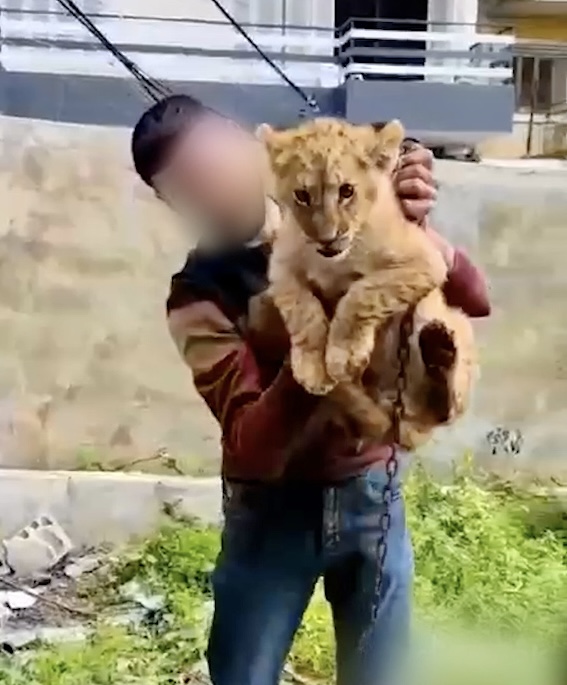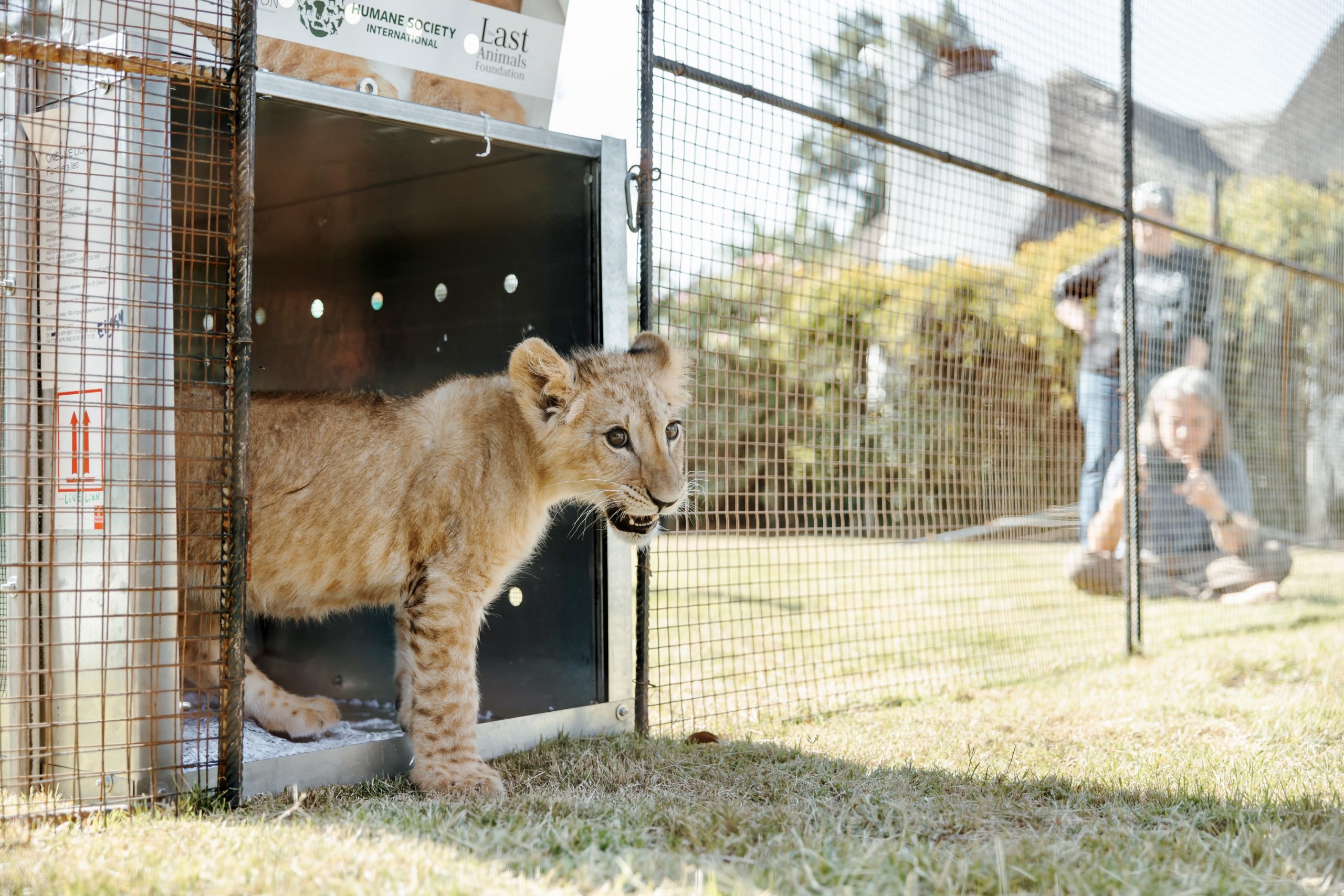A four-month-old lion cub named Pi, who was rescued from an illegal pet owner in Lebanon, has been safely relocated to his new forever home at a true sanctuary in South Africa.
Distressing social media videos surfaced in March 2024, showing the cub being exploited for selfies and petting in the streets of Lebanon. Pi was shown being kept chained up in poor conditions with his mouth taped shut.

In a globally coordinated effort, he was rescued by local group Animals Lebanon, his flight to South Africa was funded by Humane Society International (HSI), and then he was transferred to Drakenstein Lion Park just outside of Cape Town, which has offered him lifetime sanctuary. HSI previously partnered with Animals Lebanon in 2020 to rescue animals following a chemical explosion in Beirut.
Despite the private ownership of lions as pets being illegal in Lebanon, the practice is rampant, with big cats being smuggled in from neighbouring countries to feed the trade. Pi is the third captive lion cub to have been confiscated in Lebanon and brought to the sanctuary in South Africa in the past six months; cubs Issam and Kelly also found their forever homes at Drakenstein Lion Park.
 This third rehoming occurs just as South Africa’s highest levels of government unanimously approved a landmark decision to close down the captive lion breeding industry, as well as intensive breeding and management of other species such as rhinos. This is a significant policy shift and one that HSI/Africa and its partners have campaigned on for years.
This third rehoming occurs just as South Africa’s highest levels of government unanimously approved a landmark decision to close down the captive lion breeding industry, as well as intensive breeding and management of other species such as rhinos. This is a significant policy shift and one that HSI/Africa and its partners have campaigned on for years.
The intensive captive breeding of lions in South Africa mostly sustains two activities after the cubs are too big for tourist interactions: canned lion hunting—a practice of breeding lions to be shot in enclosures by wealthy hunters—and/or a grisly global trade in lion bones and skeletons.
 According to a government-commissioned Report, there are an estimated 7,800 lions kept in more than 342 captive facilities across South Africa, breeding wild animals like commodities for commercial trade purposes, with no conservation value.
According to a government-commissioned Report, there are an estimated 7,800 lions kept in more than 342 captive facilities across South Africa, breeding wild animals like commodities for commercial trade purposes, with no conservation value.
HSI/Africa has welcomed the South African Department of Forestry, Fisheries and the Environment’s Policy Position to end captive lion breeding but says the plan has some glaring omissions that need to be addressed.
The Policy currently fails to prohibit the keeping of big cats as pets and/or for interactive experiences like cub petting, ambassador species interactions, and walking with big cats. It also fails to include the closure of breeding establishments for other big cat species, such as tigers, leopards, and jaguars that could ultimately form a replacement industry for captive lion breeding.

“Pi’s ordeal in the illegal pet trade is an example of what thousands of cubs just like him endure at the hands of the captive breeding industry here in South Africa. It is heartening to know that, after many years of advocacy, South Africa’s cabinet supports an end to this cruel and exploitative industry so that these magnificent creatures will no longer be born to suffer for profit. As the Ministerial Task Team’s voluntary exit plan unfolds, and a moratorium on further lion breeding is established, numerous cubs will be saved from the clutches of profiters. However, while we commend the DFFE for its commitment to reforming this industry, we urge it to apply the ban to all captive big cats in South Africa and to include a prohibition on keeping big cats as pets,” said Dr. Audrey Delsink, wildlife director for Humane Society International/Africa.

“We at Drakenstein Lion Park, South Africa’s oldest true sanctuary, are incredibly proud to provide Pythagoras (Pi) with his forever home. Here, he will receive our expert care for the rest of his natural life, free from exploitation and abuse. We are incredibly grateful to Animals Lebanon and Humane Society International for all of their help and effort in ensuring his rescue could take place. Pi is in an evaluation and quarantine area built to his needs while his mental wounds start to recover and will graduate to a larger cub enclosure as soon as he is ready. Once this little warrior is no longer little, he will be moved into his full-size enclosure, his lifetime sanctuary,” said Shane Hart, assistant director for Drakenstein Lion Park.

Take action: you can help make a difference for the lives of lions in South Africa.
Never visit or support any facilities that offer interaction with wildlife (such as cub petting or walking with lions), or that breed and trade wildlife. Find further information, HERE!
Sign HSI/Africa’s Big Cats petition to help urge the DFFE to introduce legislation that prohibits keeping tigers, lions, and other big cat species as pets. This legislation should include banning public contact with all big cat species, not just lions, including keeping such species for promotional, educational, or entertainment purposes, and interactive experiences like cub petting and walking with big cats. SIGN HERE!
Follow HSI/Africa’s social media channels (@HSIAfrica) to find shareable information about South Africa’s captive lion breeding industry and associated activities. Please share this knowledge with your friends and family and encourage them not to be a part of this exploitative trade too.
 This third rehoming occurs just as South Africa’s highest levels of government unanimously approved a landmark decision to close down the captive lion breeding industry, as well as intensive breeding and management of other species such as rhinos. This is a significant policy shift and one that HSI/Africa and its partners have campaigned on for years.
This third rehoming occurs just as South Africa’s highest levels of government unanimously approved a landmark decision to close down the captive lion breeding industry, as well as intensive breeding and management of other species such as rhinos. This is a significant policy shift and one that HSI/Africa and its partners have campaigned on for years. According to a government-commissioned Report, there are an estimated 7,800 lions kept in more than 342 captive facilities across South Africa, breeding wild animals like commodities for commercial trade purposes, with no conservation value.
According to a government-commissioned Report, there are an estimated 7,800 lions kept in more than 342 captive facilities across South Africa, breeding wild animals like commodities for commercial trade purposes, with no conservation value.




